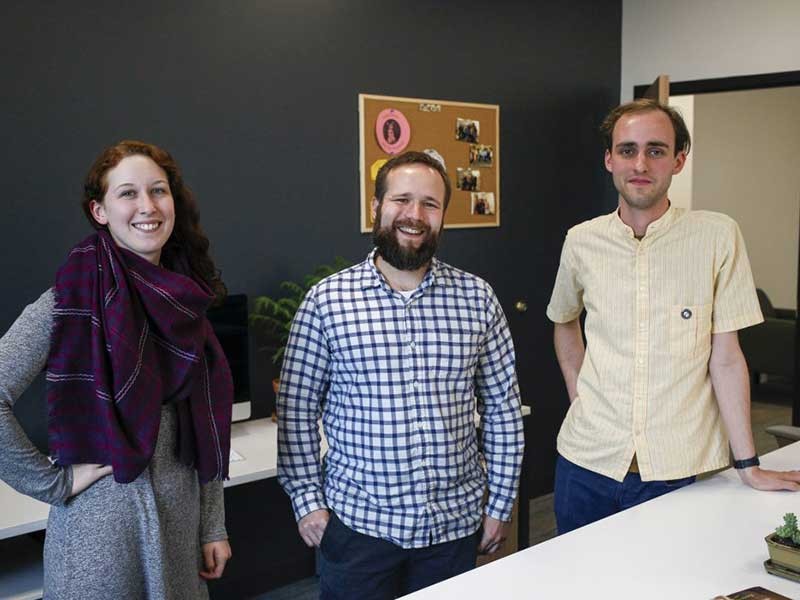Exploring Alternative Treatment with the Contextual Behavioral Science Lab
By Shelby Black |
Researchers at the Utah State University Contextual Behavioral Science Lab are coming up with innovative treatments for mental health issues. Their research focuses on Acceptance and Commitment Therapy (ACT) and self-guided approaches to dealing with different problems. With student mental health issues on the rise, the lab is constantly researching and creating new resources.
Mike Levin, co-director of the ACT program at USU, oversees the many activities that are taking place at the CBS lab.
“We are exploring self-guided resources,” Levin said. “This is a additional treatment, or in addition to getting help while they are waiting to see a therapist, or if they aren’t sure if they want to see a therapist, this is a low intensity option.”
Levin and his lab have created several self-help books related to different mental health problems. These books are available at the library for students to check out and use.
Levin is joined in his work by several graduate students, who help complete projects and studies to gain experience while working on their degrees.
Jennifer Krafft, one of the graduate students involved with CBS, is currently working on a project that deals with worry. Her study will combine testing a skills app with a mobile app. Krafft is currently recruiting those interested to come and be a part of her research, which she feels will be different from previous studies.
“We know that ACT is successful, but it hasn’t been tested in groups before,” Krafft said. “There is unique aspects of that, like getting to see people who are struggling with a similar problem and seeing other people be successful. We think the app can help people practice the skills that we are teaching the group. This kind of technology can really help integrate these skills in your life.”
Mobile apps and websites are a large part of the lab’s projects. They are looking to see if this technology can be used to facilitate effective treatments.
Carter Davis, graduate student, has seen how technology is changing behavioral science research. He said that self-help and online studies can lead to a lot of research in a short amount of time with a larger group of people. The science itself, however, doesn’t change.
“We see technology kind of comes and goes,” Davis said. “I think that when we are talking about human behavior and the science of that, it is something that doesn’t really change. There will be the trends in technology, but we are trying to look at that from a perspective that is more permanent.”
Davis hopes that their research will improve alternative treatment options for individuals seeking help and encourage people to be “proactive about their wellness.”
“It feels important because it is hopefully allowing people to make more informed choices about where they can get help and support,” Davis said. “There is a lot of barriers to getting help. I think anything to help people make smarter choices about getting help is good.”
These programs have helped break down barriers to treatment and provided options for many undergraduate students on campus. The CBS labs’ progress report stated that it had enrolled 182 students in a clinical trial for one of their programs from Fall 2016 to Spring 2018. The lab gave the following results: “71.8 percent of previously depressed students were no longer depressed, 72.5 percent of distressed students were no longer distressed, 57.7 percent of anxious students were no longer anxious, and 61.7 percent of students who had been struggling academically were no longer struggling after using the website.”
The Contextual Behavioral Sciences Lab is paving the way for alternative treatment methods for USU students. Levin hopes to see the lab continue to have success in the future.
“I think that technology helps people get access to a different type of resource,” Levin said. “I think it helps support the work that therapists and other providers give. Over time we will get better at integrating them and matching people to the services that will be best with them. It is really about giving more options and more access. Giving it a try is a great way to see if it is useful.”
If a student is experiencing mental health issues, Dr. Levin highly recommends seeking help from USU Counseling and Psychological Services first. If students are looking to try other resources along with CAPS, CBS has a variety of ongoing studies. Students can check usucbs.com if they are interested in these opportunities.
WRITER
Shelby Black
Student Reporter
Utah Statesman
shelby.black@aggiemail.usu.edu
ADDITIONAL RESOURCES
TOPICS
Research 878stories Utah Statesman 104stories Mental Health 83stories Therapy 14storiesComments and questions regarding this article may be directed to the contact person listed on this page.






